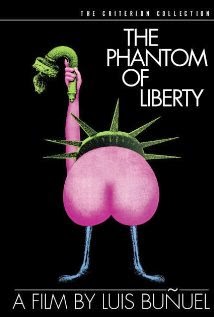The Phantom of Liberty
After their success with The Discreet Charm of the Bourgeoisie, Luis Bunuel and Jean-Claude Carriere had free reign to do whatever they wanted, and it shows in The Phantom of Liberty, from 1974. A shaggy dog story, that follows one character from a scene into another scene, starting in Napoleonic Spain and ending in a zoo, The Phantom of Liberty is funny, never dull, and most of all, surreal.
It would be hard to summarize the film but mostly, like its predecessor, it takes shots at the bourgeoisie. Memorably, there is a long scene in which upper-class parents are told that their daughter is missing, even though she is right in front of them. They take her to the police station to report she's missing, and the police inspector says it's good that she's there, so he can get her description right. I would guess this is a commentary on the cluelessness of some rich people.
Another scene takes place in a law class in a police station. The policemen act like children, pinning things to the teacher's back, and the teacher has a flashback that has people sitting at the table on toilets, but eating in privacy.
The whole film has this impish quality, leading us places and then turning it around. For example, a long stretch of the movie concerns a country inn, where a young nurse on the way to see her sick father spends the night because of a storm. Also staying there are a group of monks, whom she ends up with in a poker game; a young man and an older woman, who turn out to be nephew and aunt, and in an incestuous relationship; and a hatter and his assistant, who favor S&M, and delight in displaying this to the monks' mortification.
This kind of "create your own adventure" model would be done later by Richard Linklater in Slacker, and the surreal comedy is very reminiscent of Monty Python, but it's hard to say who is copying who. The poster, seen above, certainly suggests Terry Gilliam's animation.
The Phantom of Liberty is not classic cinema, but it's a fun diversion, and I wish more directors would take interesting chances like this.
It would be hard to summarize the film but mostly, like its predecessor, it takes shots at the bourgeoisie. Memorably, there is a long scene in which upper-class parents are told that their daughter is missing, even though she is right in front of them. They take her to the police station to report she's missing, and the police inspector says it's good that she's there, so he can get her description right. I would guess this is a commentary on the cluelessness of some rich people.
Another scene takes place in a law class in a police station. The policemen act like children, pinning things to the teacher's back, and the teacher has a flashback that has people sitting at the table on toilets, but eating in privacy.
The whole film has this impish quality, leading us places and then turning it around. For example, a long stretch of the movie concerns a country inn, where a young nurse on the way to see her sick father spends the night because of a storm. Also staying there are a group of monks, whom she ends up with in a poker game; a young man and an older woman, who turn out to be nephew and aunt, and in an incestuous relationship; and a hatter and his assistant, who favor S&M, and delight in displaying this to the monks' mortification.
This kind of "create your own adventure" model would be done later by Richard Linklater in Slacker, and the surreal comedy is very reminiscent of Monty Python, but it's hard to say who is copying who. The poster, seen above, certainly suggests Terry Gilliam's animation.
The Phantom of Liberty is not classic cinema, but it's a fun diversion, and I wish more directors would take interesting chances like this.



Comments
Post a Comment